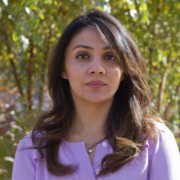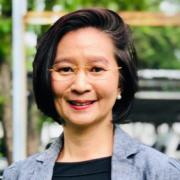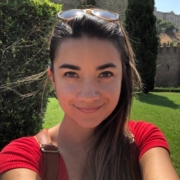I am Karen
Suwandee Thatsanaprai
 Today we launch the next and final episode of Flux for Season 3. In this episode, Suwandee Thatsanaprai, known as Beaw, shines a light on the Karen ethnic minority in Thailand. She shows the structural effects of colonization and the affective dimensions of racism. And she ponders the connections between language and identity.
Today we launch the next and final episode of Flux for Season 3. In this episode, Suwandee Thatsanaprai, known as Beaw, shines a light on the Karen ethnic minority in Thailand. She shows the structural effects of colonization and the affective dimensions of racism. And she ponders the connections between language and identity.
Beaw is a Thai-Karen education development practitioner currently working with the Southeast Asia Spark Fund initiative at the Global Fund for Children. She recently completed her master’s at the University of Bristol. She is a Season 3 Flux Fellow.
If you’re curious about the final song, you can read an English translation under the “transcript” tab.
Today’s episode was created, written, and produced by Suwandee Thatsanaprai.
Johannah Fahey was the executive producer. Brett Lashua and Will Brehm were the producers.
Special thanks to Beaw’s mother for helping write the S’gaw Karen script; Wut for inviting Beaw to his school and for his help pushing her bike on the muddy roads; and Beaw’s grandmother for sharing a different perspective that helped her learn more about her and her identity as a Karen woman.
Voices:
Voice of the ‘expat expert’: Ian Hendry
Original Voices of karen students at the school: Seij hpo, Hsaj hti, La hsgij, Hpaw moj la.
English Voice over for karen students at the school: Oscar- Seij hpo, Cleo – Hsaj hti, Archie – La Hsgij, and Khum Hom – Hpaw moj la
Original Voices of Karen adults: Hpaj se da, Tij ywa, Toj lwij, K’ Li, Hsaj hpaw, Nauj shi.
English Voice Over for Karen adults : Elliot – Hpaj se da, Jeff- Tij ywa, John – Toj lwij, Kyaw – K’ Li, Por – Hsaj hpaw, Som – Nauj shi
Music:
Kho Due Doe by P’Chi (used with permission)
Kla Kla Chi Klu Ngu by P’Chi (used with permission)
ปว่าเก่อญอก็มีหัวใจ Ver.เตหน่ากู by P’Chi (used with permission)
Thai National Anthem
High Anxiety by Phillip Mount (from Soundstripe)
Grim History performed by Lost Ghosts (from Soundstripe)
Celebrated Life performed by Lost Ghosts (from Soundstripe)
Wise Decision performed by Lost Ghosts (from Soundstripe)
Sweet Collapse by Matthew Grossman
Raindrops performed by Moments
Sound Effects:
Forest Rain Wind Light (from Soundstripe)
Beaw: Alright, somehow I am very lucky today, just found out I found another set of batteries in my bag and hopefully its gonna be a good day…
Beaw: Okay, When I noted down the term such as “dirt poor Hill Tribe” Khon Pa (คนป่า) – forest people, Khon Doi (คนดอย) – mountain people, uneducated people. Famished and uncivilised. Often I do not received this term directly to myself but it was always in the situation where I was there and that’s sort of questioned my own identity…
Beaw: When I was young, you teach me to be Thai but when I grew up you called me Khon Doi (คนดอย). Or mountain people. So Who am I then?”
Grandma: kai pga k’ nyaw de
Jor Wae: kai pga k’ nyaw hpo nye
Pii Da: kai pga k’ nyaw
Jor Shi: kai pga k’ nyaw hpo lauj
Naw Meu: kai pga k’ nyaw hpo
Expat Expert: Dirt poor Hill tribes
Naw Geiz: kai pga k’ nyaw
Expat Expert: Dirt poor Hill tribes
Jor Lay: kai pga k’ nyaw
Expat Expert: Dirt poor Hill tribes. Dirt poor Hill tribes. Dirt poor Hill tribes
Beaw: Dirt poor Hill tribes
Beaw: Are they talking about Karen people…are they talking about me or are they talking about my family…um…or are they talking about my friends …? Um, so, who am I then? I feel like because I grew up in the city and I speak perfect Thai I don’t get judged by people and there’s so many friends… that I study with, and like when they started their education, it was from a rural area, so their education level is not compatible with people in the city. And they got judged by the teacher a lot. And a lot of the time when I was younger, I feel like I cannot stand for them. I just feel like I just have to let it go and just like, listen to other people laughing at those people.
I don’t know why I’m emotional,
So, I think it’s like it’s not like something that happened naturally, that people are gonna bully the other person, but it’s because of the idea of what is best in the society?
I think I’m tired.
I think it’s what happens in society that makes people think that, , have, like, stereotypes from these people without actually thinking that ‘if I make fun of these people, how would it affect them in the long term?’ So I have got some friends who just dropped out of high school because they feel like “ I’m not, I’m not good at studying, and I’m not going to be able to compare to other people. Every time I speak Thai, people laugh at me in front of the classroom.
And I just feel like I probably couldn’t do anything back then except just be quiet.
Beaw (narration): It was very hard for me to include what you just heard because I don’t normally express my emotions, especially sadness and disappointment as it’s a sign of weakness, but I decided to put it in because the frustration, and the struggle of Karen people is real – we are just one ethnic minority of many in Thailan and I want their story to be heard.
Beaw (narration): Thailand was never colonised by the West or any other state, but the ideology of colonisation is still prevalent in Thailand, particularly in terms of the way indigenous people (who are called ethnic minorities in Thailand) are treated. I’m calling this practice, pursued by the State, “internal colonisation”. Internal colonisation happens in Thailand two ways. It is a form of colonisation that is happening within the borders of Thailand. It is also a form of colonisation that is internalised by Karen people who assume they are inferior to “real” Thais. I want to explore how internal colonisation and the rise of nationalism are the foundation of the education system in Thailand, a reality which is not generally recognised in the country. For me, this internal colonisation is most prevalent in the everyday aspect of the schooling system, an everydayness that has consequences well beyond education settings.
National Anthem:
ประเทศไทยรวมเลือดเนื้อชาติเชื้อไทย
English translation: Thailand unites the flesh and blood of Thais
เป็นประชารัฐ ไผทของไทยทุกส่วน
English translation: Every inch of the land belongs to the Thais.
อยู่ดำรงคงไว้ได้ทั้งมวล
English translation: It has long maintained its sovereignty,
ด้วยไทยล้วนหมาย รักสามัคคี
English translation: Because Thais pursue and cherish unity.
ไทยนี้รักสงบ แต่ถึงรบไม่ขลาด
English translation: Thailand craves peace, yet when the call to defend arises,
เอกราชจะไม่ให้ใครข่มขี่
English translation: We will not retreat, we will never surrender.
สละเลือดทุกหยาดเป็นชาติพลี
English translation: With every drop of blood sacrificed for the nation,
เถลิงประเทศชาติไทยทวี มีชัย ชโย
English translation: Glorious be the Land of Thailand, long may it reign.”
Beaw (narration): What you just heard was the Thai national anthem. The anthem is broadcast and sung at 8 o’clock every morning in every school in Thailand. The first three lines of the national anthem are: “Thailand unites the flesh and blood of Thais, Every inch of the land belongs to the Thais It has long maintained its sovereignty”. The beeps you heard before the singing are part of the daily broadcast. They put people on alert and work to subtlety discipline the State’s subjects. Whenever I hear them now, I am reminded of Michel Foucault’s idea that schools and prisons have the same social function in that they “define classify and control people”.
Beaw (narration): The Karen students that you heard singing the national anthem and who are now singing a song in the background that praises the King are aged between 3 and 13 years old. They are singing in their school which is in a Village that is 100 kilometres from Chiang Mai, the capital of Northern Thailand.
Their village is surrounded by vast mountains and dirt roads. Although it is a relatively short distance from Chiang Mai it took me over 5 hours, on a motorbike wired with chains around the wheels, to get to the school from the city in the rainy season. I remember pushing the bike more than riding it. I remember that the dirt roads had been turned into thick, almost impassable, mud…
Beaw: Yeah so it’s quite nice to get myself back into this environment.)
Beaw (narration): But at the same time, there are also many mixed and complex feelings about it.
I decided to come to the school because I wanted to know how younger students see or identify themselves, especially when they haven’t yet been exposed to the outside world.
Beaw: It was a rainy Monday morning at the school, the nice cool breeze, surrounded by greenery and drizzle of rain, made it look like the school was sitting in such a perfect location. The students start turning up to school around 7.30, because of the rain so they turn up from their home already quite wet. And obviously, they are wearing their school uniforms
Beaw (narration): Next you’re going to hear a conversation I’m having with some Grade 6 students. They’re in their last year of school and they’ll need to leave the village to study somewhere else. They are all very shy, and most of the conversation is full of giggling and whispering which is quite hard to hear. I do wonder if they felt shy because I unintentionally forced the conversation to be in Thai. I wonder if they would’ve felt more comfortable and confident if our conversation was in Karen. But actually, I did start the conversation in Karen, by asking a question:
Beaw: mex kaux pga meij cav na nej kai nej gax laux nej sav kej taiv di lauj (Karen)
Beaw (narration): “If somebody asked: ‘who are you?’ what would you say to them?” but no one replied.
Beaw (narration): Was that because of my Karen, did they not understand what I was trying to say? Or did they not reply because they were at school, and they knew they could only speak in Thai?
Beaw (narration): Just as an aside, I want to say something before you hear my field recordings, because I’m providing English translation of the voices of the Karen people, I feel like I’m contradicting myself. I want to echo the story of Korean people. I want their voices to be heard and their emotions to be captured. But by privileging English, I worry that I’m just reinforcing the idea that we need yet another colonial language to tell the story. I don’t resolve this contradiction here, but I needed to say something anyway. Also, when you hear my interviews with the younger students, you’ll hear an annoying constant banging sound. Sorry about this. The kids were fascinated with the sound meters on my recorder. They enjoyed seeing the animated bars dance every time they hit the table, and so they hit the table a lot.
Beaw( narration): As I said, my conversation with the school’s children starts with a simple question, if someone asks, Who are you? What would you say to them?
Beaw: ถ้ามีคนถามว่าเราเป็นใคร เราจะตอบเขาว่ายังไง (Thai)
Seij Hpo: เป็นคนดอย (Thai)
English translation: I am a mountain person
Hsaj hti: เป็นคนกะเหรี่ยง (Thai)
English translation: I am Karen
Beaw (narration): How can people tell or know if you are a (mountain person)?
Beaw: เขาจะรู้ได้ไงว่าคนไหนเป็นคนดอย เมื่อกี้บอกว่าอะไรนะ (Thai)
Hsaj hti: av wai gax taiv pga k’ nyaw bax av wai gax taiv pga k’ nyaw t’ bax (Karen)
English translation: Karen could speak Karen but Thai could not.
Seij Hpo: mex kaux ya taiv di lauj (Karen)
English translation:“what did I say? Let me think about it again.”
Beaw (narration): ‘Seij hpo” is speaking in Karen, but he’s whispering because he knows he shouldn’t be speaking in Karen in the classroom, he then says in Thai:
Seij Hpo: คนดอยพูดไทย ไทยไม่ค่อยชัดครับ (Thai)
English translation: Khon Doi could not speak Thai properly
Beaw( narration): The young students’ answers were interesting, but sad. Was I surprised by their answers? No, not at all. Since I was their age the idea of what constitutes “Thainess”, real Thainess, hasn’t changed. The distinction between being Karen or Thai remains. You can’t be both, you can only be one or the other. What was unexpected was that while I was asking a class of Grade 2 students about their identity, the younger students were testing my own identity and my ability to speak Karen. They were testing to see whether I was a “real Karen” or not.
La Hsgij: พี่ พี่พูดกะเหรี่ยงได้มั้ยครับ (Thai)
English translation: Can you speak Karen?
Beaw: ได้สิ ทำไมจะไม่ได้ละ อยากให้พี่พูดภาษาอะไร (Thai)
Beaw (narration): Of course, what language do you want me to Speak?
La Hsgij & Hpaw moj la: กะเหรี่ยง (Thai)
English translation: Karen
Beaw: ทำไมอะ (Thai)
Beaw (narration): Why?
Hpaw moj la: คิดว่า เขาคิดว่าพี่พูดไม่เป็นคะ (Thai)
English translation: He thinks that you can’t speak Karen.
Beaw: ทำไมถึงคิดว่าพี่พูดไม่เป็น (Thai)
Beaw (narration): Why do you think I can’t speak Karen?
La Hsgij: ผมคิดว่าพี่พูดไทยครับ (Thai)
English translation: I think you speak Thai.
Beaw narration: La Hsgij: assumes that because I speak in Thai that I am Thai. And because I am Thai I can’t speak Karen. Even though I tell him that I can speak Karen, he still doesn’t believe me. He then asks me in Thai
La Hsgij: a neij (in Karen) ภาษากะเหรี่ยงพี่พูดว่า ต้นไม้ (Thai)
English translation: “How do you say tree in Karen?” (a beat later than the Thai)
Beaw: Seij
Beaw (narration): You can barely hear my voice because of the teacher’s voice in the background but I say “Seij” Se in Karen means tree.
La Hsgij: ชมพู่ ya taiv na (Karen)
English translation: “I told you she could speak!”
Beaw (narration): He then asks me in Thai to say the Karen words for:
La Hsgij: ดอกไม้ (Thai)
Beaw: Flower
Beaw: hpaw (Karen)
La Hsgij: คน (Thai)
Beaw: Human
Beaw: Pga k’ nyaw (Karen)
La Hsgij: เสื้อ (Thai)
Beaw: Shirt
Beaw: Hseij ka (Karen)
La Hsgij: เข็มขัด (Thai)
Beaw: Belt
Beaw: yauj kiv kauj (Karen)
Beaw (narration): It’s funny because the way La Hsgij tested my Karenness mimicked the way these students are taught Thai. My Karen answer was the only valid answer for him just as their Thai answer is the only valid answer for the teacher in the classroom.
Beaw (narration): Thai is the only language that is allowed to be spoken at school, so the minute these students step into the schoolyard they need to leave their first language behind. This undermines the importance of their Karen mother tongue and to some extent their own Karenness. This process happens in the classroom but it is replicated beyond the classroom where Karen people are mocked for speaking Thai badly and are often seen as not being real Thais.
Beaw (narration): Language is so powerful. Speaking Thai identifies you as Thai, but your accent also identifies who you are. In Thailand there’s only one accent that is accepted as “real Thai” which is a central -Bangkok accent. The Karen language is in a different language family than the Thai language so many Karen people do have a Karen accent when they speak in Thai. This makes them less inclined to speak in this language, but, I wonder, does it make them any less Thai?
Beaw (narration): At the end of each day at the school, I would record a voice memo to reflect on what I had seen and felt. In the voice memo you are going to hear I am talking about a poster that is pinned to the wall of most Thai classrooms. It’s titled “the 12 values of Thais”.
Beaw (narration): These values are what you can hear the students reciting in the background. Value Number 1: Adore the Nation, Religion and His Majesty the King. Value Number 2: Maintain good Thai customs and traditions. Value Number 3: Be dedicated to the publics’ and the nations’ benefit rather than one’s own benefits.
Beaw: “Um …. I think that’s that’s quite … that is quite nationalist. I first remember this when I was teaching in a Thai school in 2015. Yeah that was when it first came out it came out under the with the military government. Seeing it all the time today, and just reading it , it sort of make me feel.. funny. I don’t know how I felt at that time, but I feel like there’s something in there that makes me feel bad that I didn’t follow it, even though, I didn’t really want to follow it. And coming in and spending all my days at the schools, sleeping in the school, seeing the Thai flag, seeing the portraits of the Thai kings, seeing everything involving around there just brought me back and just .. like it’s that really weird feeling of huh?? Maybe I behave badly yeah just came into my mind sort of a mixed feelings.
Beaw (narration): Are my mixed feelings the result of my internal wrestling with who I am? Is this how internal colonisation in Thailand works? Yes, it works at the State level by creating a hierarchy with Thais at the very top, where the top equals good, and ethnic minorities at the very bottom, where the bottom equals bad. But it also works on an individual embodied level, getting under the skin of Karen people — getting under my skin — to create feelings of being different and excluded, which leads to doubt — my mixed feelings — and feelings of being inferior and worth less than real Thais. Is this the impact of internal colonisation … I have taken it in and projected it out in the form of my own guilt? Those were the feelings I was left with when I visited a school in a village in the hills.
Beaw (narration): What you’re going to hear next is some other thirty something Karen people, reflecting on their own experiences in the classroom.
Hpaj se da:– เวลาไปโรงเรียนเราก็ต้องพูดภาษาไทย เป็นภาษาบังคับ ถ้าพูดภาษาถิ่นอะไรพวกนี้เราก็โดนตีอะ ตอนประถมอะนะ ครูคือโคตรชาตินิยมเลย โคตรชาตินิยมเลย (Thai)
English translation: When I was in primary school, it was mandatory to use Thai and if you spoke in the local language, you’d be hit by the teacher. The teachers were extremely nationalistic
Tij ywa: ไม่กล้า ไม่กล้าออกไปพรีเซนต์หน้าชั้นเรียนเลยอะ บอกตรงๆว่าสมัยก่อนพูดไทยไม่ชัด ตอนนี้ก็ไม่ค่อยชัดนะ แต่ก็ดีขึ้นมานิดนึง (Thai)
English translation: I never wanted to go and speak in the front of the classroom because my Thai was not good back then, it’s still not great now but it’s a bit better. (laughing) (a beat later than the Thai)
Beaw (narration): Toj lwij speaks Thai with almost no Karen accent at all, so I wondered if he experienced any discrimination:
Toj lwij: เหมือนเรารู้สึกเอง เรารู้สึกไม่ค่อยมั่นใจในตัวเองเท่าไหร่ ก็เวลาจะพูดจะทำอะไรก็ส่งผลกับการกระทำทุกอย่างอะ พอเวลาเราจะพูดจะทำอะไรก็มันก็ดูส่งผลไปทุกอย่างอะ ทำให้เราไม่กล้าแสดงออก ไม่กล้ามั่นใจในตัวเอง เพราะสาเหตุอันนั้นด้วยหรือเปล่า (Thai)
English translation:: I never experienced it myself, it’s just my feelings, maybe just how I feel, I don’t know, I just don’t feel quite confident to do things. It’s like when I want to speak or do something, I just feel like I don’t have any confidence to do it which could be because of who I am.
Toj lwij: ตอนสมัยอยู่ ม.ปลายอะ แล้วก็ช่วงมหาลัยใหม่ๆ มันไม่ได้อายแบบไม่กล้าพูดเลยนะ แต่ว่ายังไงอะ แต่มันก็อายแบบ มันไม่เต็มร้อยอะ ทั้งๆที่เราไม่เคยเจอกับตัวนะ แต่อาจจะเป็นเพราะเห็นคนอื่นโดนดูถูกเราก็เลยกลัวว่าจะโดน ประมาณนั้นอะ (Thai)
English translation: When I was in high school and the early years of university it was not that I was so ashamed, but I just felt that I was not 100%. I think it could be from the shared experiences of others as even though I never once experienced it I still felt scared that people would know my identity as a Karen.
Beaw (narration): Is this (emphasis here) how internal colonisation works? As a kind of insidious violence committed against the self by the self? Not by external forces, not by the forces of an army or by violent suppression. This is a subtle violence. One that makes you feel unconfident. One that makes you feel unsure of yourself. One that makes you feel scared to identify yourself as Karen.
Beaw (narration): I noticed that in all my interviews, we conversed in Thai. Only the expressions that couldn’t be described in Thai were expressed in Karen. I asked Hpaj se da after his interview why we didn’t talk to each other in Karen. He said he could express his thoughts better in Thai, and that some terms and words weren’t available in a simple language like Karen. It left me wondering if thinking in Thai has an impact on Karen people’s sense of who they are. In my conversations I asked: Do you identify as Karen? How is language linked to your identity?
Tij ywa: ถ้าสมัยก่อนนี้ ไม่ค่อยกล้าเลย ไม่ค่อยกล้าบอก ยิ่งช่วงที่เรียนหนังสือ ยิ่งช่วงที่อยู่กับเพื่อน เนี่ยไม่ค่อยกล้าพูดภาษาตัวเองเลยเมื่อก่อน เมื่อก่อนเนี้ยไม่กล้าพูดเลย (Thai)
English translation: In the past I did not, especially during my school years, I didn’t dare to speak any Karen at all, I never wanted to talk to friends in Karen I didn’t want to be known as a Karen.
K’ Li: ตอนนี้ผมก็พูดนะ แต่ว่าเมื่อก่อน ผมรู้สึกว่าผมอาย ไม่กล้าพูดภาษาเลย กลัวเขาจะนินทาเรา กลัวเขาจะไม่ยอมรับเรา (Thai)
English translation: I now speak Karen, but I didn’t speak it before because I would be treated differently from “other Thais”
Hsaj hpaw: ถ้าเมื่อก่อนนี้อาจจะอายนะแต่ว่าหลังๆมาก็บอกคนอื่นว่าเป็นกะเหรี่ยง อาจจะเป็นเพราะเมื่อก่อนเรายังเด็กเลยกลัวว่าคนอื่นเขาจะล้อหรือเปล่า (Thai)
English translation: In the past, I was ashamed but in recent years I’ve told people I am Karen. Maybe I was young back then, I was worried about being discriminated against.
Hsaj hpaw: แต่ว่าสามีเราไม่ยอมพูดภาษากับเราเวลาไปเยี่ยมที่ทำงาน มันบอกว่ามันอาย มันอายที่เป็นกะเหรี่ยง (คนชนเผ่า) มันบอกว่าถ้าทำงานเป็นหัวหน้าหรือตำแหน่งสูงๆ ถ้าเขารู้ว่าเราเป็นชนเผ่า คนจะไม่ค่อยเคารพ เท่ากับคนไทย (Thai)
English translation: My husband refuses to speak to me in Karen when I visited him at his work, he was embarrassed. He is embarrassed because he is Karen. He told me that when working as a manager or at a higher level, if they know that you are from a hill tribe, people will respect you less than Thai people.
Beaw (narration): Remember at the start you heard the voice of an old white man saying
Expat Expert: Dirt Poor Hill Tribes
Beaw (narration): That was my fictional recreation of a person who I call an expat expert: a white guy living in Thailand who claims to be an expert on Thailand and who calls us “ Dirt Poor Hill Tribes”. Maybe you’re thinking that calling people names doesn’t affect people very much, but maybe it does:
Hpaj se da: จำได้แม่นเลยตอนอยู่ประถมมีครูจากสารภี เรียกเราว่า ยางกะเลอกินข้าวเบอะ จำได้แม่นเลยนะ กะเลอคือพวกที่อยู่หลังเขา พวกที่ไม่พัฒนา อันนี้คือเหยียดจริงๆเลยเหยียดตรงๆเลย (Thai)
English translation: Oh, I remembered when I was in primary school, there’s a teacher from Saraphi, who called us Yang Ka Ler eat Khao Ber. Kaler – Kaler means those living behind the mountain – those underdeveloped… this is the real racism.
Hpaj se da: ครูเขามองเราว่าเราสกปรก จับเราอาบน้ำ หน้าหนาว หนาวจะตายห่า ขาแตก หน้าแตกแต่จับเราอาบน้ำเย็นตอนเช้า (Thai)
English translation: The teacher sees us as dirty. They even forced us to have a shower on a cold morning when our skin was already so dry and cracked and our lips were shaking, and we were shivering from the cold.
Hpaj se da: คือเราต้องดีอะ เราต้องดีมากๆเลย คือเราต้องดีกว่าคนอื่นเราถึงจะได้รับการยอมรับว่าเราเสมอเท่าคนอื่น ถ้าเราแค่ดีเท่าคนอื่นคือเราไม่ดี เราต้องทำมากกว่าเพื่อที่เราจะได้เท่ากับคนอื่น เรารู้สึกเหมือนกับว่าเราไม่ใช่คน เขามองเราต่ำกว่าเขา (Thai)
English translation: We have to be good, really good. Only if we are better than others Thai, we would then be able to be accepted. If we are just as good as them it means we are not good enough. We have to keep trying to work much harder and be outstanding only then we would be accepted to be part of the society. I felt dehumanised, because we are valued as less than the “Thais
Nauj Shi: pga kau pe yau hpo av ta t’ ox nau mi ba haij ox le pgaw yoj kauj kla taij waij bav do ca taij waij bav blau blau bav pe sav shiv lauj pe sav taij pga bav do ca rav taij pga bav do ca nav kei pe ma te bav (Karen)
English translation: People tell us that we are from Myanmar, and we have nothing, and we came took things from Thailand, those words really hurt. It’s cut through my heart deeply and made me feel so small I could not do anything, but I just feel that I am shrinking when hearing these comments.
Tij ywa: คนเขาชอบดูถูกคนดอยหน่อยไง เวลาทะเลาะกันทีไรเขาจะชอบพูดว่า เดี๋ยวจะทำให้กลับดอยไปเลย กลับไปเลยอย่างนั้นนะ (Thai)
English translation: People like looking down at us. When we have disagreements, they always say “Go back to the mountains where you are from”
Beaw (narration): On one of my trips back home, back to my home in the mountains where I am from, I decided to talk to my grandmother about her identity by asking her – “Grandma, who are you?”
Beaw: piv ya cav na ne hsoj moj neij kaij n’nga lauj (Karen)
Beaw (narration): She’s laughing and so does my uncle who’s sitting nearby because my question sounded stupid to them for two reasons: firstly, because she knew I knew who she was because, obviously, she’s my grandmother. And secondly, because I asked in Karen –
Beaw (narration): which suggests she’s Karen. Anyway, she replied:
Pii Tulu: kaij pga k’ nyaw ne (Karen)
Beaw: I am Karen, of course
Beaw (narration): I then asked her what does it mean to be Karen and why aren’t you Thai because you also have Thai ID? I expected her to give me a long answer about Karen traditions, culture, and food in the same way I was taught about Thainess. Surprisingly, she replied:
Pii Tu Lu: aa mav sav dij laux aa lauj bax pa hkaev tauj de cij meij pa aux da waiv di pga k’ nyaw aa lauj pga k’nyaw ba ga lauj sav de yoj aa t’ wi htauj le yoj ba aa bav laij le yoj mav lij ma caj bav lail le yoj kev lev ma pi pga k’nyaw t’ sei t’ gauj aa nau p’ taij p’ kaij pga k’ nya nauj nau aa law t’ pooj dau yoj nau miv ma ta pe laij pooj laij ba ga de yoj nauj mav lij ma caj ba laij le yoj te wiv htauj pgaw nyaw nau miv ba (Karen)
Beaw (narration): I am Karen, a real Karen … I’m from a Karen Village, was born here and have lived here throughout my life but everything still has to be done by Thais. I thought we were just Karen people living together. How come so many things depend on them? Karen people can’t get anything done for us or by ourselves. I am Karen but it’s just my identity, it’s meaningless because everything around us is Thai.
Beaw (narration): “How come so many things depend on them?”, she asked. I didn’t have an answer to her question at the time. But I am hoping that one day I will have an answer and when I do I will explain it to her very clearly and lovingly in Karen. I am hoping that one day I will have an answer and when I do I will explain it to her very clearly and lovingly in Karen.
THE END
Music: – ปว่าเก่อญอก็มีหัวใจ เนื้อเพลง (lyrics)
ใครๆเขาหาว่าฉันนั้นเป็นคนป่า
They call me the dweller of the forest.
เป็นคนไร้ซึ่งที่อยู่อาศัย
Adrift, they say I have no home
เป็นคนต่างถิ่นต่างแดน
A stranger in a strange land.
ซึ่งตัวฉันนั้นไม่เข้าใจ
Yet, I am lost in their words
ฉันเรียกตัวเองว่าปวาเกอะญอ
I name myself “Pga K’ Nyaw”
ซึ่งหมายความว่าฉันก็คือคน
For it speaks of my true being as a“human”
ปวาเกอะญอ ปวาเกอะญอ ปวาเกอะญอ ปวาเกอะญอ
Pga K’ Nyaw Pga K’ Nyaw Pga K’ Nyaw Pga K’ Nyaw
คน ปวาเกอะญอ ก็มีหัวใจ
Pga K’ Nyaw, too, has a heart.
ฉัน เป็นคนป่า ฉัน เป็นคนภูเขา ใช่ ฉันเป็น
Indeed, I am of the forest, I am of the mountains, yes, I am
ฉัน อยู่บนภูเขา ทำมาหากิน
dwelling my life upon the hills,
โปรดจงเข้าใจ ฉันมีจิตใจเหมือนคนทั่วไป
But please, also understand me. Feelings, I hold them as others do.
Want to help translate this show? Please contact info@freshedpodcast.com
Watch:
Read more about Karen People:
https://ethnicity.sac.or.th/database-ethnic/187 ( you would need to use google translate plug-in to translate the page as it is written in Thai)
https://karenwomen.org/background-of-the-karen-people/
https://ethnomed.org/culture/karen/
Read more about nationalism in Thailand:
Imagined communities: Reflections on the origin and spread of nationalism.
Siam Mapped: A History of the Geo-body of a Nation.
The others within: Travel and ethno-spatial differentiation of Siamese subjects 1885-1910.
A Plastic Nation: The Curse of Thainess in Thai-Burmese Relations.
Read more about education and ethnic minorities in Thailand:
Ethnicity and the politics of ethnic classification in Thailand.
Becoming indigenous peoples in Thailand.
Education for Being Thai-ness among Indigenous Peoples in the North.
Have any useful resources related to this show? Please send them to info@freshedpodcast.com









